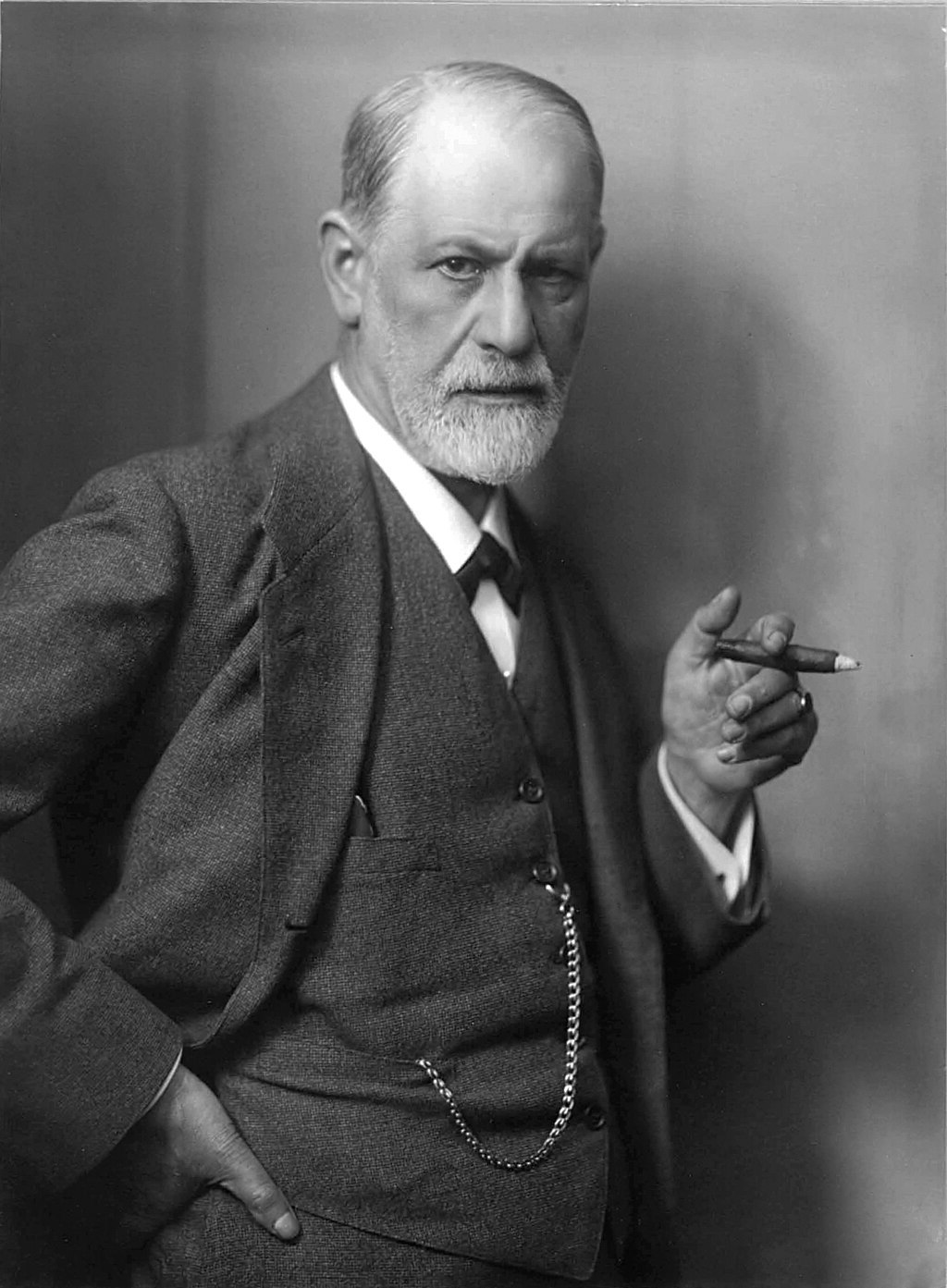
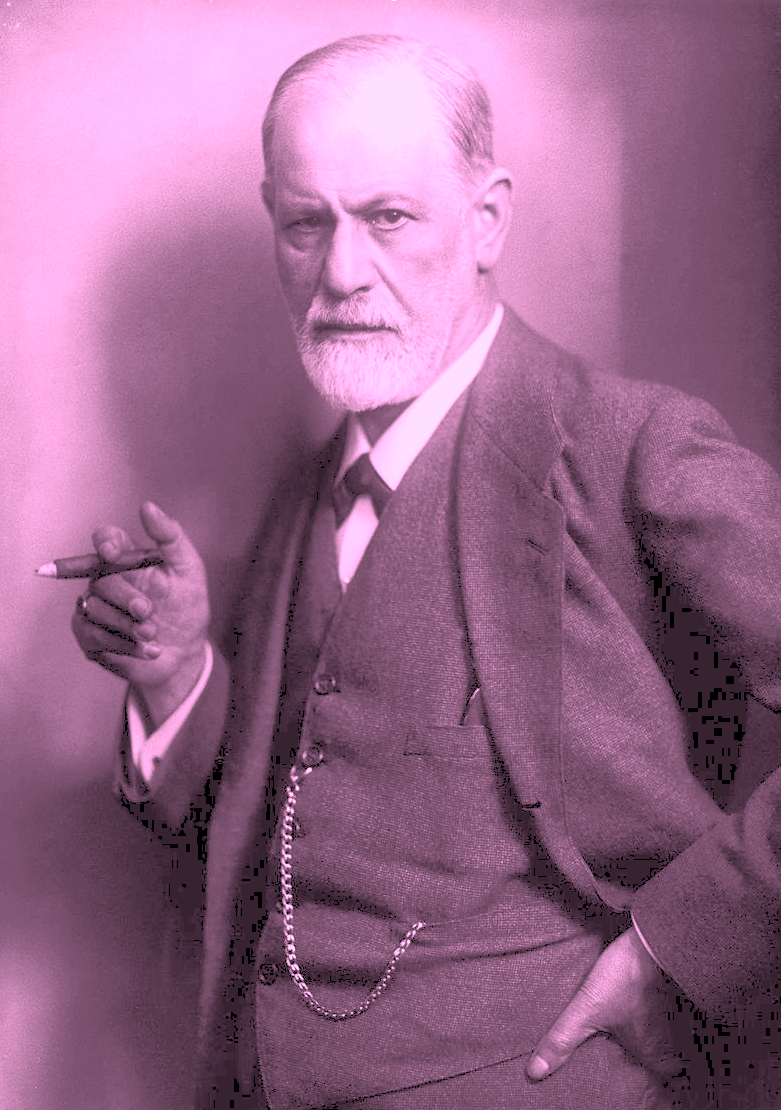
性の心理学的発達
Psychosexual development


☆ 精神分析学において、性の心理学的発達、つまり精神性発達(psychosexual development) は性的衝動理論の中心的な要素である。フロイトによると、人格は、子供の快楽を求めるエネルギーが特定の性感帯に集中する一連の幼児期段階を経て発達す る。性感帯とは、刺激に対して特に敏感な身体の部位として特徴づけられる。精神性発達の5つの段階は、口腔、肛門、陰茎、潜在、生殖器である。各段階に関 連する性感帯は快楽の源となる。特定の段階で満足できない場合、固着状態になる可能性がある。一方、満足できる場合、健全な人格が形成される。ジークムン ト・フロイトは、子どもが心理性的発達のどの段階においても欲求不満を経験した場合、神経症や機能的精神障害として成人期まで続く不安を経験すると提唱し た。
| In psychoanalysis,
psychosexual development is a central element of the sexual drive
theory. According to Freud, personality develops through a series of
childhood stages in which pleasure seeking energies from the child
become focused on certain erogenous areas. An erogenous zone is
characterized as an area of the body that is particularly sensitive to
stimulation. The five psychosexual stages are the oral, the anal, the
phallic, the latent, and the genital. The erogenous zone associated
with each stage serves as a source of pleasure. Being unsatisfied at
any particular stage can result in fixation. On the other hand, being
satisfied can result in a healthy personality. Sigmund Freud proposed
that if the child experienced frustration at any of the psychosexual
developmental stages, they would experience anxiety that would persist
into adulthood as a neurosis, a functional mental disorder.[1][2] |
精神分析学において、精神性発達は性的衝動理論の中心的な要素である。
フロイトによると、人格は、子供の快楽を求めるエネルギーが特定の性感帯に集中する一連の幼児期段階を経て発達する。性感帯とは、刺激に対して特に敏感な
身体の部位として特徴づけられる。精神性発達の5つの段階は、口腔、肛門、陰茎、潜在、生殖器である。各段階に関連する性感帯は快楽の源となる。特定の段
階で満足できない場合、固着状態になる可能性がある。一方、満足できる場合、健全な人格が形成される。ジークムント・フロイトは、子どもが心理性的発達の
どの段階においても欲求不満を経験した場合、神経症や機能的精神障害として成人期まで続く不安を経験すると提唱した[1][2]。 |
Background Sigmund Freud, c. 1921 Sigmund Freud (1856–1939) observed that during the predictable stages of early childhood development, the child's behavior is oriented towards certain parts of their body, for example the mouth during breast-feeding or the anus during toilet-training. In psychoanalysis, the adult neurosis (functional mental disorder) is thought to be rooted in fixations or conflicts encountered during the developmental stages of childhood sexuality. According to Freud, human beings are born "polymorphous perverse": infants can derive sexual pleasure from any part of their bodies and any object. Over time the socialization process channels the (originally non-specific) libido into its more fixed mature forms.[3] Given the predictable timeline of childhood behavior, he proposed "libido development" as a model of normal childhood sexual development, wherein the child progresses through five psychosexual stages – the oral; the anal; the phallic; the latent; and the genital – in which the source pleasure is in a different erogenous zone. |
背景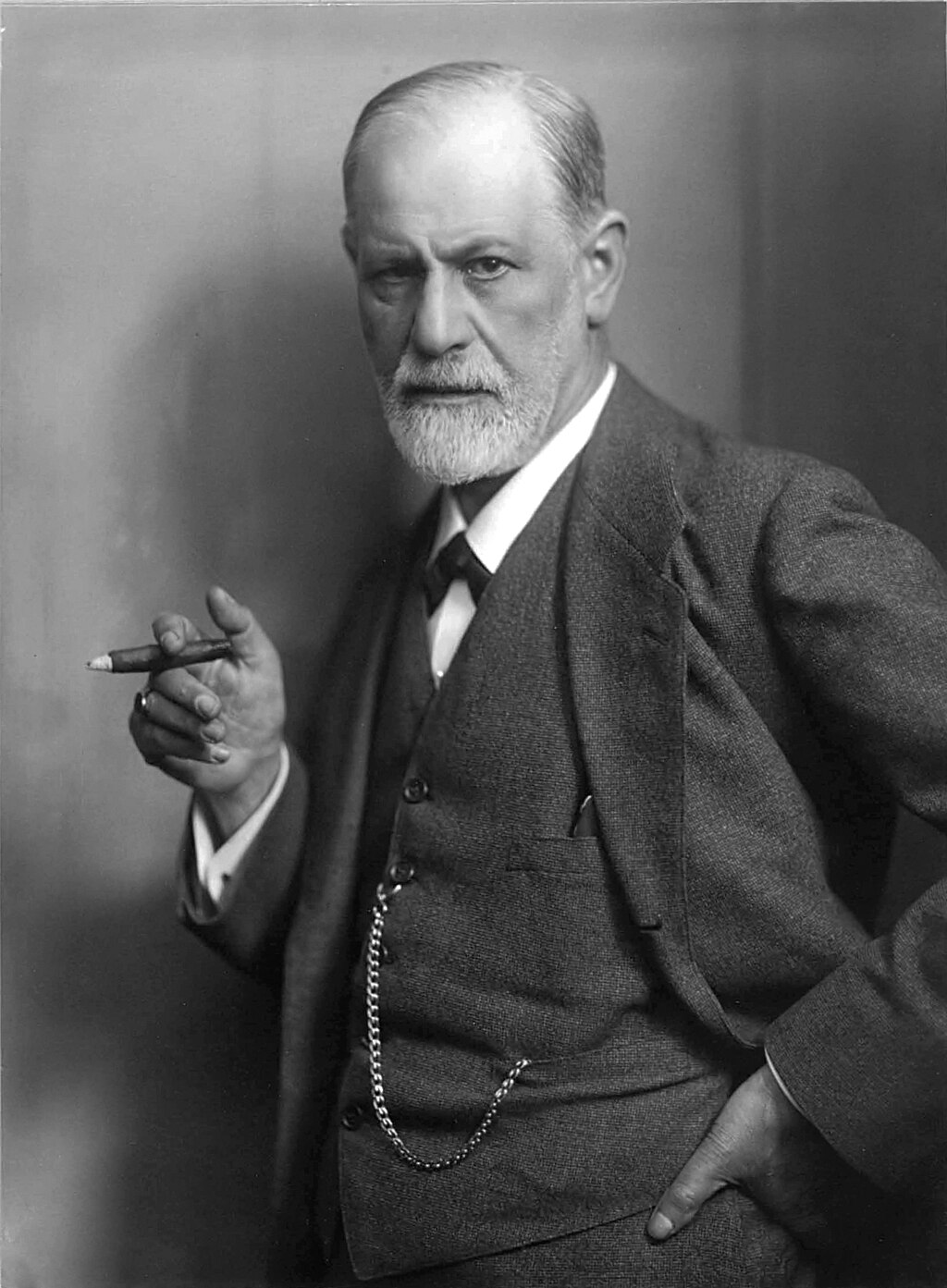 ジークムント・フロイト、1921年頃 ジークムント・フロイト(1856-1939)は、乳児期の予測可能な発達段階において、子どもの行動は特定の身体部位、例えば授乳中の口やトイレトレー ニング中の肛門などに向けられると指摘した。精神分析学では、成人の神経症(機能的精神障害)は、子どもの性的発達の段階において経験する固着や葛藤に根 ざしていると考えられている。フロイトによると、人間は「多形倒錯」として生まれる。乳児は、体のどの部分やどんな物からでも性的快楽を得られる。時間の 経過とともに、社会化のプロセスにより、(もともと特定のものではなかった)リビドーがより固定的な成熟した形へと導かれる[3]。子どもの行動の予測可 能なタイムラインを考慮し、彼は「リビドーの発達」を正常な子どもの性的発達のモデルとして提唱した。このモデルでは、子どもは5つの心理性的段階(口腔 期、肛門期、男性器期、潜伏期、生殖器期)を経て成長し、快楽の源泉がそれぞれの異なる性感帯となる。 |
| Freudian psychosexual development Sexual infantilism: in pursuing and satisfying their libido (sexual drive), the child might experience failure (parental and societal disapproval) and thus might associate anxiety with the given erogenous zone. To avoid anxiety, the child becomes fixated, preoccupied with the psychological themes related to the erogenous zone in question. The fixation persists into adulthood and underlies the personality and psychopathology of the individual. It may manifest as mental ailments such as neurosis, hysteria, "female hysteria", or personality disorder. 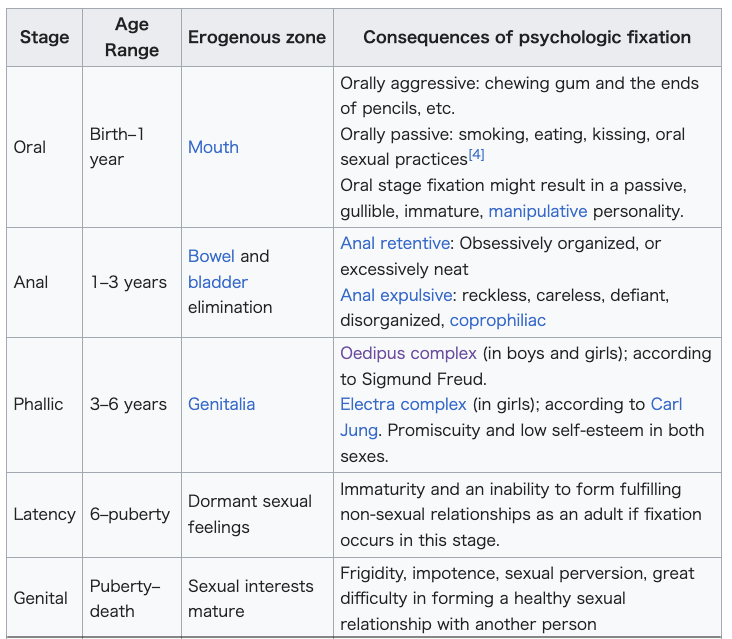 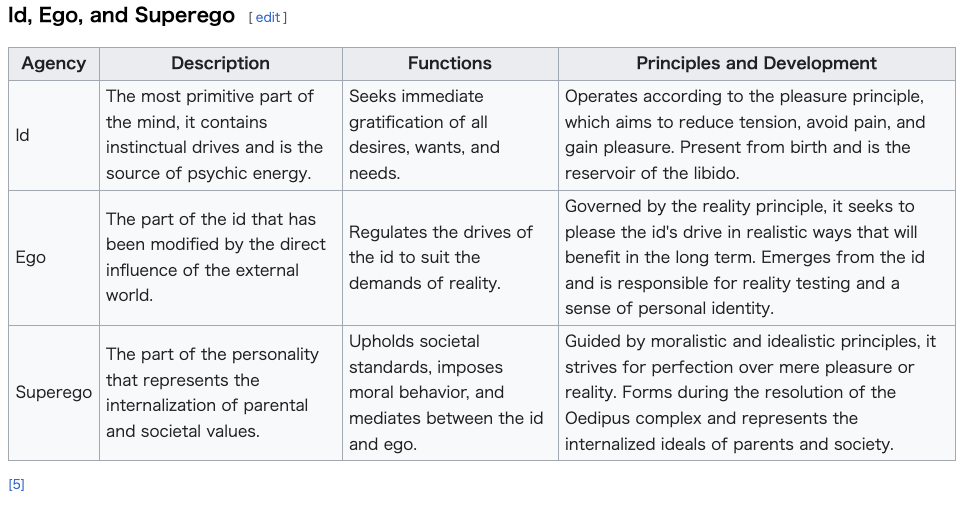 |
フロイトの性的心理発達(→イド・エゴ・スーパーエゴ) 性的幼児性: 子どもたちは、自らの性欲(性的衝動)を追求し満たす過程で、失敗(親や社会からの非難)を経験し、特定の性感帯に不安を覚えるようになる可能性がある。 不安を回避するために、子どもは特定の性感帯に関連する心理的テーマに固執し、そればかりに気を取られるようになる。この固定観念は成人期にも続き、その 人の人格や精神病理の根底にある。神経症、ヒステリー、「女性ヒステリー」、人格障害などの精神疾患として現れる可能性がある。   |
| Oral stage Main article: Oral stage Oral needs may be satisfied by thumb-sucking. The first stage of psychosexual development is the oral stage, spanning from birth until the age of one year, wherein the infant's mouth is the focus of libidinal gratification derived from the pleasure of feeding at the mother's breast, and from the oral exploration of their environment, i.e. the tendency to place objects in the mouth. The child focuses on nursing, with the intrinsic pleasure of sucking and accepting things into the mouth.[6] Since the ego is not developed beyond the most rudimentary form at this stage, every action is based upon the pleasure principle of the id. Nonetheless, the infantile ego is in the process of forming during the oral stage. In developing a body image, infants are aware of themselves as discrete from the external world; for example, the child understands pain when it is applied to their body, thus identifying the physical boundaries between body and environment. The experience of delayed gratification leads to understanding that specific behaviors satisfy some needs; for example, crying gratifies certain needs.[7] Weaning is the key experience in the infant's oral stage of psychosexual development, their first feeling of loss consequent to losing the physical intimacy of feeding at their mother's breast. The child is not only deprived of the sensory pleasures of nursing but also of the psychological pleasure of being cared for, mothered, and held. However, weaning increases the infant's self-awareness, through learning that they do not control their environment. The experience of delayed gratification leads to the formation of capacities for independence (awareness of the limits of the self) and trust (behaviors leading to gratification). Thwarting of the oral-stage – too much or too little gratification of desire – might lead to an oral-stage fixation, which can be the root of neurotic tendencies in the developed personality. In the case of too much gratification, the child does not adequately learn that they do not control the environment, and that gratification is not always immediate, thereby forming an immature personality.[6] In the case of too little gratification, the infant might become passive upon learning that gratification is not forthcoming, despite having produced the gratifying behavior.[7] Anal stage Main article: Anal stage The second stage of psychosexual development is the anal stage, spanning from the age of eighteen months to three years,[8] wherein the infant's erogenous zone changes from the mouth (the upper digestive tract) to the anus (the lower digestive tract), while ego formation continues. Toilet training is the child's key anal-stage experience, occurring at about the age of two years. It involves conflict between the id (demanding immediate gratification) and the ego (demanding delayed gratification) in eliminating bodily wastes, and handling related activities (e.g. manipulating excrement, coping with parental demands). The child may respond with defiance, resulting in an 'anal expulsive character'—often messy, reckless, and defiant—or with retention, leading to an 'anal retentive character'—typically neat, precise, and passive-aggressive.[6] The style of parenting influences the resolution of the conflict, which can be either gradual and psychologically uneventful, or which can be sudden and psychologically traumatic. The ideal resolution of the conflict is that the child adjusts to moderate parental demands that teach the value and importance of physical cleanliness and environmental order, thus producing a self-controlled adult. The outcome of this stage can permanently affect the individual's propensities toward possession and attitudes toward authority. If the parents make immoderate demands of the child, by too strictly enforcing toilet training, it might lead to the development of a compulsive personality, a person too concerned with neatness and order. If the parents consistently allow the child to indulge the impulse, the child might develop a self-indulgent personality characterized by personal slovenliness and environmental disorder. Phallic stage Main article: Phallic stage Oedipus explains the riddle of the Sphinx, Jean Auguste Dominique Ingres (c. 1805) The third stage of psychosexual development is the phallic stage, spanning the ages of three to six years, wherein the child's genitalia are their primary erogenous zone. It is in this third infantile development stage that children become aware of their bodies, the bodies of other children, and the bodies of their parents; they gratify physical curiosity by undressing and exploring each other as well as their genitals, and so learn the physical (sexual) differences between male and female and their associated social roles. In the phallic stage, a boy's decisive psychosexual experience is the Oedipus complex—his son–father competition for possession of his mother. The name derives from the 5th-century BC Greek mythologic character Oedipus, who unwittingly killed his father and sexually possessed his mother. In the young male, the Oedipus conflict stems from his natural love for his mother, a love which becomes sexual as his libidinal energy transfers from the anal region to the genital. The boy observes that his father stands in the way of his love and desire for possession of his mother. He therefore feels aggression and envy towards his father, but also a fear that his (much stronger) rival will strike back at him. As the boy has noticed that women, his mother in particular, have no penises, he is particularly struck by the fear that his father will remove his penis too. This castration anxiety surpasses his desire for his mother, so the desire is repressed. Although the boy sees that he cannot possess his mother, he reasons that he can possess her vicariously by identifying with his father and becoming as much like him as possible: this identification is the primary experience guiding the boy's entry into his appropriate sexual role in life. A lasting trace of the oedipal conflict is the superego, the voice of the father within the boy. By thus resolving his incestuous conundrum, the boy passes into the latency period, a period of libidinal dormancy.[6] Initially, Freud applied the theory of the Oedipus complex to the psychosexual development of boys, but later developed the female aspects of the theory as the feminine Oedipus attitude and the negative Oedipus complex.[9] The feminine Oedipus complex has its roots in the little girl's discovery that she, along with her mother and all other women, lack the penis which her father and other men possess. Her love for her father then becomes both erotic and envious, as she yearns for a penis of her own. She comes to blame her mother for her perceived castration, and is struck by penis envy, the apparent counterpart to the boy's castration anxiety.[6] Freud's student–collaborator, Carl Jung, coined the term Electra complex in 1913.[10][11] The name derives from the 5th-century BC Greek mythologic character Electra, who plotted matricidal revenge with her brother Orestes, against their mother and stepfather, for the murder her father. (cf. Electra, by Sophocles).[12][13][14] According to Jung, a girl's decisive psychosexual experience is her daughter–mother competition for psychosexual possession of her father. Freud rejected Jung's term as psychoanalytically inaccurate: "that what we have said about the Oedipus complex applies with complete strictness to the male child only, and that we are right in rejecting the term 'Electra complex', which seeks to emphasize the analogy between the attitude of the two sexes".[15][16] The resolution of the feminine Oedipus complex is less clear-cut than the resolution of the Oedipus complex in males. Freud stated that the resolution comes much later and is never truly complete. Just as the boy learned his sexual role by identifying with his father, so the girl learns her role by identifying with her mother in an attempt to possess her father vicariously. At the eventual resolution of the conflict, the girl passes into the latency period, though Freud implies that she always remains slightly fixated at the phallic stage.[6] Despite the mother being the parent who primarily gratifies the child's desires, the child begins forming a discrete sexual identity – "boy", "girl" – that alters the dynamics of the parent and child relationship; the parents become the focus of infantile libidinal energy. The boy focuses his libido (sexual desire) upon his mother, and focuses jealousy and emotional rivalry against his father – because it is he who sleeps with the mother. Seeking to be united with his mother, the boy desires the death of his father, but the ego, pragmatically based upon the reality principle, knows that the father is the stronger of the two males competing to possess the one female. Nevertheless, the boy remains ambivalent about his father's place in the family, which is manifested as fear of castration by the physically greater father; the fear is an irrational, subconscious manifestation of the infantile Id.[17] 'Penis envy' in the girl is rooted in anatomic fact: without a penis, she cannot sexually possess the mother, as the infantile id demands. As a result, the girl redirects her desire for sexual union toward the father; thus, she progresses towards heterosexual femininity that ideally culminates in bearing a child who replaces the absent penis. After the phallic stage, the girl's psychosexual development includes transferring her primary erogenous zone from the infantile clitoris to the adult vagina. Freud considered a girl's Oedipal conflict to be more emotionally intense than that of a boy, potentially resulting in a submissive woman of insecure personality.[18] In both sexes, defense mechanisms provide transitory resolutions of the conflict between the drives of the Id and the drives of the ego. The first defense mechanism is repression, the blocking of anxiety-inducing impulses and ideas from the conscious mind. The second defense mechanism is Identification, by which the child incorporates, to their ego, the personality characteristics of the same-sex parent. The boy thus diminishes his castration anxiety, because his identification with the father reduces the rivalry and suggests the promise of a future potency. The girl identifies with the mother, who understands that, in being females, neither of them possesses a penis, and thus they are not antagonists.[19] Latency stage Main article: Latency stage The fourth stage of psychosexual development is the latency stage (from the age of 6 until puberty), wherein the child consolidates the character habits they developed in the three earlier stages. Whether or not the child has successfully resolved the Oedipal conflict, the instinctual drives of the child are inaccessible to the ego, because they have been subject to the mechanism of repression during the phallic stage. Hence, because the drives are latent (hidden) and gratification is indefinitely delayed, the child must derive the pleasure of gratification from secondary process-thinking that directs the energy of the drives towards external activities, such as schooling, friendships, hobbies, etc. Any neuroses established during the latent stage of psychosexual development might derive from the inadequate resolution of the Oedipus conflict, or from the ego's failure in attempts to direct the energies towards socially acceptable activities. Genital stage Main article: Genital stage The fifth stage of psychosexual development is the genital stage (from puberty through adult life) and usually represents the greater part of a person's life. Its aim is the psychological detachment and independence from the parents. In the genital stage the person confronts and seeks to resolve their remaining psychosexual childhood conflicts. As in the phallic stage, the genital stage is centered upon the genitalia, but the sexuality is consensual and adult, rather than solitary and infantile. The psychological difference between the phallic and genital stages is that the ego is established in the latter; the person's concern shifts from primary-drive gratification (instinct) to applying secondary process-thinking to gratify desire symbolically and intellectually by means of friendships, a love relationship, family and adult responsibility. |
口唇期 メイン記事:口唇期 口腔の欲求は、親指しゃぶりで満たされることがある。 心理性的発達の第一段階は口腔期であり、誕生から1歳までの期間に及ぶ。この期間、乳児の口は、母親の乳房で授乳することから得られる快楽、および口を 使って周囲を探る、つまり物を口に入れる傾向から得られるリビドー的満足感の中心となる。子供は授乳に焦点を当て、物を口に含み受け入れることによる本質 的な快楽を味わう[6]。自我はこの段階では最も初歩的な形を超えて発達していないため、あらゆる行動はイドの快楽原則に基づいている。とはいえ、幼児期 の自我は口腔期に形成される過程にある。身体イメージを発達させる過程で、乳児は自分自身を外界から切り離された存在として認識するようになる。例えば、 子どもたちは自分の身体に痛みを感じ、身体と環境の物理的な境界を認識する。満足を先延ばしにする経験は、特定の行動が特定の欲求を満たすことを理解する きっかけとなる。例えば、泣くことで特定の欲求が満たされる[7]。 離乳は、乳児期の口唇期における心理的性発達において重要な経験であり、母親の胸で授乳するという身体的親密さを失うことで初めて感じる喪失感である。子 供は授乳による感覚的な喜びを奪われるだけでなく、世話や母性、抱っこによる心理的な喜びも奪われる。しかし、離乳は、乳児が自分の環境をコントロールで きないことを学ぶことで、乳児の自己認識を高める。 満足の遅延という経験は、自立能力(自己の限界の認識)と信頼(満足につながる行動)の形成につながる。 口腔期における欲求の充足が過度または不十分であることで、口腔期固着が生じることがある。これは、発達した人格における神経症傾向の根本原因となりう る。過剰な満足感を与えると、子どもは自分が環境をコントロールできないことや、満足感が常に即座に得られるわけではないことを十分に学べず、未熟な人格 を形成してしまう可能性がある[6]。満足感が十分に得られないと、満足感を得られる行動をとったにもかかわらず、満足感が得られないと知った乳児は受動 的になる可能性がある[7]。 肛門期 メイン記事: 肛門期 心理的性発達の第二段階は肛門期であり、18ヶ月から3歳までの期間に及ぶ[8]。この期間に、自我の形成が進む中で、乳児の性感帯が口(上部消化管)か ら肛門(下部消化管)へと変化する。トイレトレーニングは、2歳頃に起こる、子供にとって重要な肛門期体験である。これは、身体の老廃物を排出すること や、それに関連する活動(排泄物の処理、親の要求への対応など)において、イド(即時の満足を求める)とエゴ(遅れた満足を求める)の葛藤を伴う。子供は 反抗的な態度で反応し、「肛門排出型」の性格(しばしば乱雑で無謀、反抗的)になるか、または排便を我慢することで「肛門保持型」の性格(典型的には几帳 面で正確、受動攻撃的)になる[6]。子育てのスタイルは、この葛藤の解決に影響を与える。解決は徐々に心理的に何事もなく進む場合もあれば、突然に心理 的外傷を与える場合もある。 この葛藤の理想的な解決方法は、子どもが適度な親の要求に順応し、清潔さや整頓の大切さを学ぶことで、自制心のある大人になることである。この段階の結果 は、個人の所有欲や権威に対する態度に永続的な影響を与える可能性がある。親が子どもに過度な要求をし、トイレトレーニングを厳格に強要しすぎると、強迫 性パーソナリティ、つまり清潔さや整頓にこだわりすぎる人物の育成につながる可能性がある。もし親が常に子供の衝動を許容していれば、子供は身だしなみや 環境に対する無頓着さを特徴とするわがままな性格に育つ可能性がある。 ファルス期(男根期) メイン記事: ファルス期 スフィンクスの謎を解くオイディプス、ジャン・オーギュスト・ドミニク・アングル(1805年頃) 心理的性発達の第三段階は、3歳から6歳までのファルス期であり、この時期は子供の性器が主な性感帯となる。幼児の発達段階の3つ目にあたるこの段階にお いて、子どもたちは自分の体、他の子どもたちの体、そして両親の体に気づき、服を脱いだり、お互いの体や性器を触ったりして、身体的な好奇心を満たす。こ うして、男女の身体的(性的)な違いと、それに関連する社会的役割を学ぶ。男根期において、男の子の決定的な心理的性的経験は、エディプス・コンプレック ス、つまり息子と父親が母親の所有権を巡って争うことである。この名前は、紀元前5世紀のギリシャ神話に登場するエディプスに由来している。エディプス は、知らず知らずのうちに父親を殺し、母親を性的所有物にしてしまった。若い男性の場合、エディプス・コンプレックスは、母親に対する自然な愛情から生じ る。この愛情は、リビドーのエネルギーが肛門領域から性器へと移行するにつれ、性的なものへと変化する。少年は、父親が母親に対する愛情と所有欲の妨げに なっていると認識する。そのため、父親に対して攻撃性や嫉妬心を抱くが、自分よりもはるかに強いライバルが自分に報復するのではないかという恐怖も抱く。 少年は、女性、特に母親には陰茎がないことに気づいているため、父親が自分の陰茎も取り除くのではないかという恐怖に特に襲われる。この去勢不安は母親に 対する欲望を上回るため、欲望は抑圧される。少年は母親を所有することはできないと理解しているが、父親に同化し、できるだけ父親に似た人間になること で、母親を間接的に所有できると解釈している。この同化は、少年が人生において適切な性的役割を担うようになる上で、最も重要な経験となる。エディプス・ コンプレックスの永続的な影響として、少年の内なる父親の声である超自我が残る。こうして近親相姦のジレンマを解決することで、少年は潜伏期、つまりリビ ドーが休眠する時期へと移行する[6]。 当初、フロイトはエディプスコンプレックスの理論を少年の心理的性発達に適用していたが、後に女性的なエディプスコンプレックスとして、女性的なエディプ ス態度と否定的なエディプスコンプレックスという理論を展開した[9]。女性的なエディプスコンプレックスは、少女が、自分や母親、そして他の女性には、 父親や他の男性が持っているペニスがないことに気づくことから始まる。そして、自分のペニスを熱望するあまり、父親への愛はエロティックで嫉妬に満ちたも のとなる。彼女は、自分が去勢されたと感じ、母親を責め、男の子の去勢不安の明らかな対極にある陰茎への羨望に襲われるようになる[6]。 フロイトの学生であり協力者でもあったカール・グスタフ・ユングは、1913年にエレクトラ・コンプレックスという用語を考案した[10][11]。 1913年[10][11]。この名称は、紀元前5世紀のギリシャ神話に登場するエレクトラに由来している。エレクトラは、父親の殺害の罪を問われた母親 と義父に対して、兄オレステースとともに母殺しの復讐を企てた。(ソフォクレスの『エレクトラ』を参照)。[12][13][14] ユングによると、少女にとって決定的な心理的性体験とは、父親の心理的性的な所有権をめぐっての娘と母親の競争である。フロイトはユングの用語を精神分析 的に不正確として拒否した。「エディプス・コンプレックスについて述べたことは、厳密に言えば男児にのみ当てはまるものであり、男女の態度の類似性を強調 しようとする『エレクトラ・コンプレックス』という用語を拒絶することは正しい」[15][16]。 女性のエディプス・コンプレックスの解決は、男性のエディプス・コンプレックスの解決よりも明確ではない。フロイトは、その解決ははるかに後になってよう やく起こり、決して完全に終わることはない、と述べた。少年が父親に同化することで性的役割を学ぶように、少女は父親を代理的に所有しようとする母親に同 化することで、自分の役割を学ぶ。最終的に葛藤が解決すると、少女は潜伏期へと移行するが、フロイトは、少女は常にファルス的段階にわずかに固執し続ける と示唆している[6]。 母親は、主に子供の欲求を満たす親であるにもかかわらず、子供は「男の子」「女の子」という個別の性的アイデンティティを形成し始め、それによって親と子 の関係に変化が生じる。両親は幼児的なリビドーのエネルギーの焦点となる。男の子は、母親に性欲(性的欲望)を向け、父親に対して嫉妬と感情的な対抗意識 を抱く。母親と結ばれたいと願う男の子は、父親の死を望むが、現実主義に基づく自我は、一人の女性を巡って争う二人の男性のうち、父親の方が強いことを 知っている。しかし、少年は父親が家族の中で占める地位について依然として両義的な感情を抱き続けており、それは身体的に大きな父親による去勢への恐怖と して表れる。この恐怖は、幼児的自我の非合理的で無意識的な現れである[17]。女の子の「ペニスへの羨望」は解剖学的事実に根ざしている。つまり、ペニ スがなければ、幼児的自我が要求するように、母親を性的対象とすることはできない。その結果、少女は性的結合への欲望を父親に向け、理想的な形として、不 在の陰茎の代わりとなる子供を産むことで頂点に達する異性愛的な女性らしさへと進んでいく。 ファルス段階の後、少女の心理的性的な発達は、主要な性感帯を幼児期のクリトリスから大人の膣へと移行させることを含む。フロイトは、少女のエディプス・ コンプレックスは少年のそれよりも感情的に強烈であり、その結果、従順で自信のない女性になる可能性があると考えた[18]。 男女ともに、防衛機制は、イドとエゴの衝動の間の葛藤を一時的に解決する。最初の防衛機制は抑圧であり、不安を引き起こす衝動や考えを、意識から遮断する ものである。2つ目の防衛機制は同一化であり、これにより子供は、同性の親の性格的特徴を自我に取り入れる。 こうして、少年は去勢不安を和らげることができる。父親との同一化により、競争意識が弱まり、将来の可能性が示唆されるからだ。少女は母親と自分を同一化 し、女性である以上、どちらも陰茎を持っていないため、対立する存在ではないことを理解する[19]。 潜伏期 メイン記事: 潜伏期 心理的性発達の第四段階は潜伏期(6歳から思春期まで)であり、この期間に子供はそれまでの3つの段階で培った性格の癖を固めていく。子供がエディプス・ コンフリクトをうまく解決したかどうかに関わらず、子供の本能的な衝動は、ファルス期において抑圧のメカニズムに服従させられたため、自我には届かない。 したがって、衝動は潜在的(隠された)であり、満足感は先延ばしになるため、子供は、衝動のエネルギーを学校教育、友人関係、趣味などの外的な活動に向け る二次的思考プロセスから、満足感の喜びを引き出さなければならない。心理性的発達の潜在的段階の間に確立された神経症は、エディプス・コンフリクトの不 十分な解決、または、エネルギーを社会的に容認される活動に向けるエゴの失敗に起因する可能性がある。 性器期(生殖器期) メイン記事:生殖器期 心理性的発達の5番目の段階は生殖器期(思春期から成人期)であり、通常、人の人生の大部分を占める。 その目的は、心理的に親から自立することである。生殖器期では、人は幼少期の心理的葛藤と向き合い、解決しようとする。ファルス期と同様、生殖器期も性器 が中心となるが、性的な欲求は孤独で幼児的なものではなく、合意に基づく大人のものである。ファルス期と生殖器期の心理的な違いは、後者では自我が確立さ れるという点である。つまり、人の関心は第一次的欲求の満足(本能)から、友情、恋愛関係、家族、大人の責任といった手段を用いて、象徴的かつ知的に欲求 を満たすために二次的思考プロセスを適用することへと移行する。 |
| Criticisms Scientific According to Frank Cioffi, a criticism of the scientific validity of the psychoanalytical theory of human psychosexual development is that Freud was personally fixated upon human sexuality.[20] Freud stated that his patients commonly had memories and fantasies of childhood seduction. According to Frederick Crews, critics hold that these were more likely to have been constructs that Freud created and forced upon his patients.[21] Feminist Main article: Feminist views on the Oedipus complex Some feminists criticize Freud's psychosexual development theory as being sexist and phallocentric,[22] arguing that it was overly informed by his own self-analysis. In response to the Freudian concept of penis envy in the development of the feminine Oedipus complex, the German Neo-Freudian psychoanalyst Karen Horney, counter-proposed that girls instead develop "Power envy" rather than penis envy.[22] She also proposed the concept of "womb and vagina envy", the male's envy of the female ability to bear children. Some contemporary theorists suggest, in addition to this, the envy of the woman's perceived right to be the kind parent.[23] Anthropologic 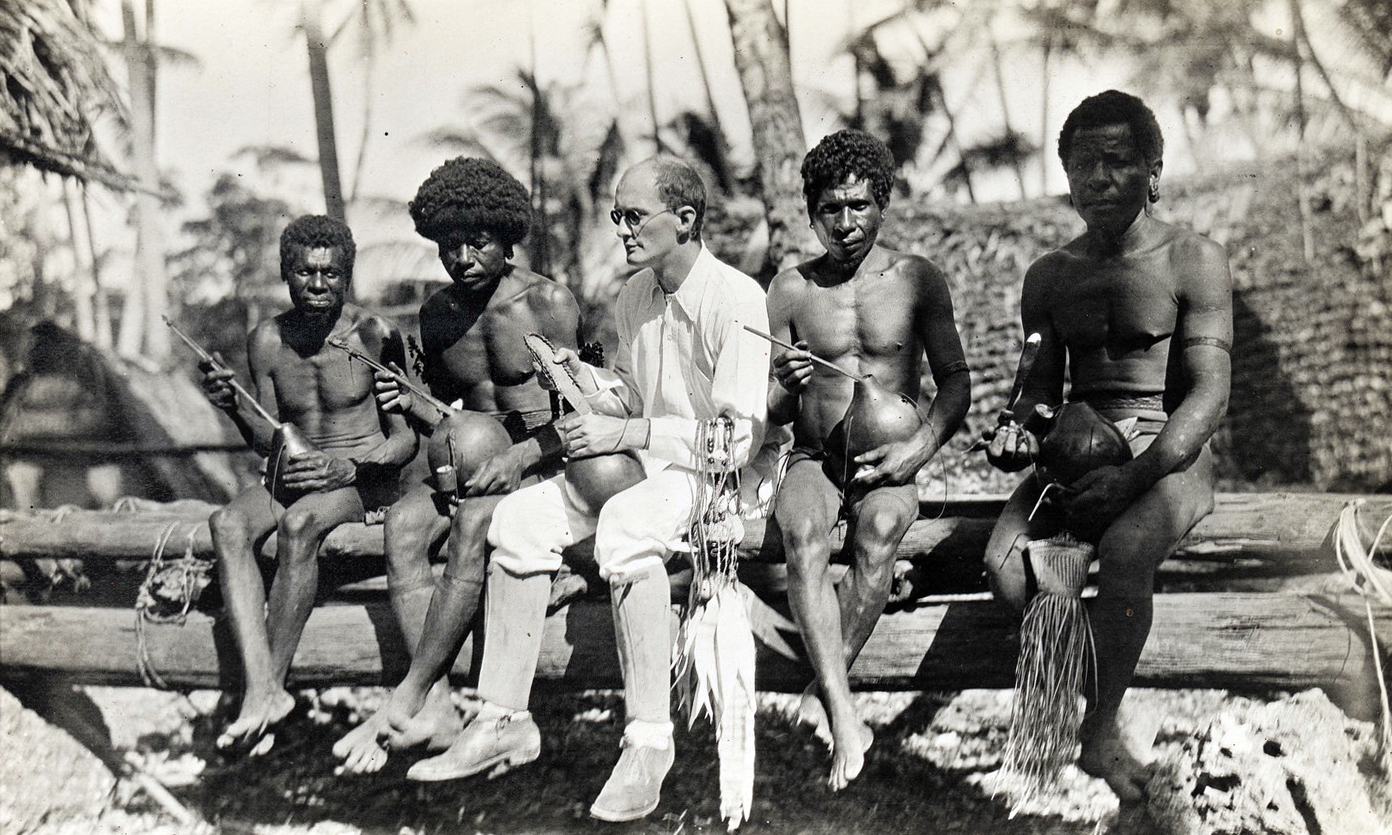 Bronisław Malinowski and natives, Trobriand Islands (1918) Contemporary cultural considerations have questioned the normative presumptions of the Freudian psychodynamic perspective that posits the son–father conflict of the Oedipal complex as universal and essential to human psychologic development. The anthropologist Bronisław Malinowski's studies of the Trobriand islanders challenged the Freudian proposal that psychosexual development (e.g. the Oedipus complex) was universal. He reported that in the insular matriarchal society of the Trobriand, boys are disciplined by their maternal uncles, not their fathers (impartial, avuncular discipline). In Sex and Repression in Savage Society (1927), Malinowski reported that boys dreamed of feared uncles, not of beloved fathers, thus, power – not sexual jealousy – is the source of Oedipal conflict in such non–Western societies. Furthermore, contemporary research confirms that although personality traits corresponding to the oral stage, the anal stage, the phallic stage, the latent stage, and the genital stage are observable, they remain undetermined as fixed stages of childhood, and as adult personality traits derived from childhood.[24] |
批判 科学的 フランク・チョッフィによると、人間の性的心理発達の精神分析理論の科学的妥当性に対する批判は、フロイトが個人的に人間の性愛に固執していたというものである[20]。 フロイトは、彼の患者は一般的に子供の頃の誘惑の記憶や空想を持っていると述べた。フレデリック・クルーズによると、批評家たちは、これらはフロイトが作り出したものであり、患者に押し付けたものである可能性が高いと主張している[21]。 フェミニスト メイン記事: エディプス・コンプレックスに対するフェミニストの見解 一部のフェミニストは、フロイトの精神性発達理論を性差別的で男中心主義的であると批判し、それはフロイト自身の自己分析にあまりにも影響されていると主 張している[22]。女性におけるエディプスコンプレックスの形成におけるペニスへの羨望というフロイトの概念に対し、ドイツのネオフロイト派の精神分析 学者カレン・ホーニーは、少女はペニスへの羨望ではなく「権力への羨望」を抱くという逆説を提唱した[22]。また、彼女は「子宮と膣への羨望」という概 念も提唱した。これは、男性が女性の子供を産む能力に羨望を抱くというものである。現代の理論家の中には、これに加えて、女性が良き親になる権利を持って いると認識されていることに対する嫉妬も指摘する者もいる[23]。 人類学  ブロニスワフ・マリノフスキーとトロブリアンド諸島の原住民(1918年) 現代の文化的考察では、エディプスコンプレックスの息子と父親の葛藤を普遍的で人間の心理的発達に不可欠なものとみなすフロイトの精神力動的観点の規範的な前提が疑問視されている。 人類学者ブロニスワフ・マリノフスキーによるトロブリアンド諸島民の研究は、精神性愛的発達(例えばエディプス・コンプレックス)が普遍的であるというフロ イトの提案に異議を唱えた。彼は、トロブリアンドの島嶼母系社会では、少年たちは父親ではなく母方の叔父たちによってしつけられる(公平で叔父らしいしつ け)と報告した。『未開社会の性愛と抑圧』(1927年)の中で、マリノフスキーは、少年たちが愛する父親ではなく、恐れられている叔父を夢に見ることを 報告し、このような非西洋社会におけるエディプス・コンプレックスの根源は、性的嫉妬ではなく権力にあると述べた。さらに、現代の研究では、口腔期、肛門 期、男根期、潜伏期、生殖期に対応する性格的特質は観察できるものの、それらが子どもの固定的な段階として、また子どもの頃の経験から派生した大人の性格 特性として確定したものではないことが確認されている[24]。 |
| Amphimixis Herma Min (god) Fertility Bacchanalia Vanir Phallic monism Priapus Sigmund Freud Orgastic potency |
両性具有 ヘルマ 神 豊穣 バッカナリア ヴァニル 男根一元論 プリュアプス ジークムント・フロイト オルガスムス |
| https://en.wikipedia.org/wiki/Psychosexual_development |
|
***
リ ンク
文 献
そ の他の情報
Copyleft, CC, Mitzub'ixi Quq Chi'j, 1996-2099
☆
 ☆
☆